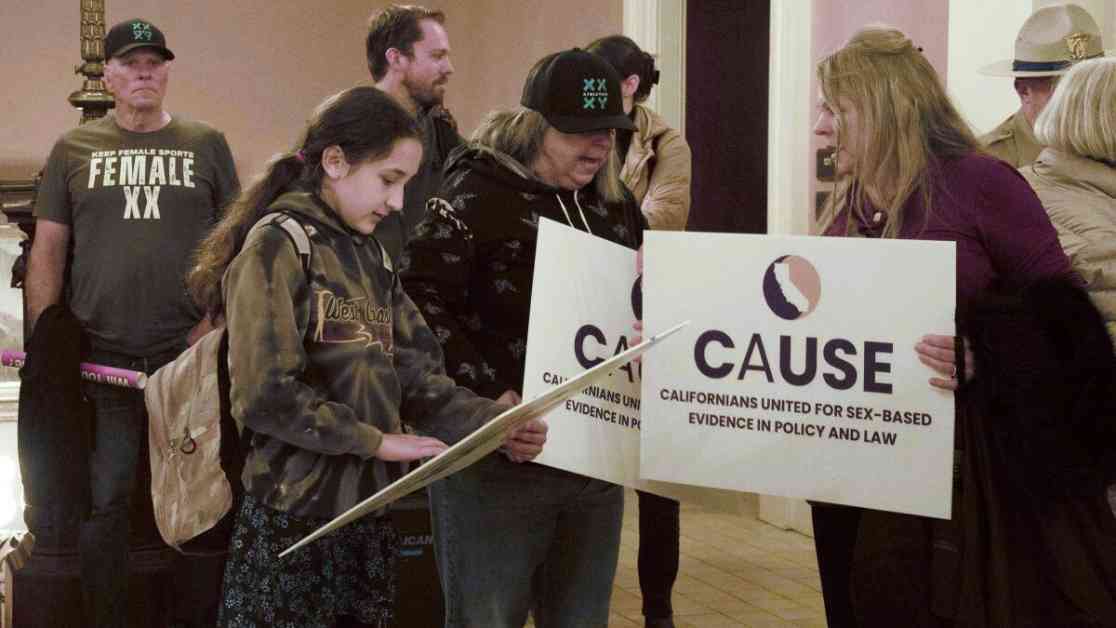In a heated clash of opinions, California lawmakers recently grappled with Republican-sponsored bills aimed at restricting transgender high school athletes from participating in girls’ and women’s sports. Despite the fervent testimonies that echoed through the ornate Capitol hearing room, the outcome seemed predetermined in a state where Democrats hold a supermajority, rendering Republican influence relatively powerless. The central focus, it seemed, was the fiery debate itself that unfolded on a Tuesday morning.
Passionate Testimony and Political Divide
Assembly Bill 89, proposed by Assemblymember Kate A. Sanchez (R-Trabuco Canyon), sought to compel the California Interscholastic Federation to bar any student assigned male at birth from joining a girls’ high school team. Additionally, Assembly Bill 844, presented by Assemblymember Bill Essayli (R-Corona), aimed to enforce the use of facilities corresponding to an individual’s sex assigned at birth. As the bills were introduced, Assemblymember Christopher M. Ward (D-San Diego), chair of the Assembly’s Arts, Entertainment, Sports, and Tourism Committee, convened the hearing in response to Republican grievances about their concerns being overlooked in the predominantly Democratic Legislature.
The anticipation surrounding the hearing was palpable as a diverse crowd gathered at the state Capitol. Representatives from various sectors, such as roller derby athletes, volleyball players, track stars, parents, nurses, doctors, church leaders, school board members, teachers, and academics, converged to voice their perspectives. The atmosphere crackled with intensity as individuals eagerly awaited their turn to address lawmakers and advocate for or against the bills.
While California boasts a substantial high school athletic population of 1.76 million students, with around 800,000 actively participating in sports, the exact number of transgender students partaking in these activities remains unspecified by the California Interscholastic Federation. At the collegiate level, recent congressional testimony revealed that less than ten out of half a million athletes identify as transgender. Despite the relatively low statistics, the contentious issue of transgender athletes in sports has ignited a national firestorm of debate in the political arena.
Clashing Viewpoints and Contentious Debate
The discourse has polarized the political landscape, with Republicans characterizing the matter as a glaring example of “woke” politics spiraling out of control. Former President Trump frequently referenced the issue during his campaign, culminating in an executive order aimed at withholding funding from educational programs that allegedly impede women and girls from equitable athletic opportunities. In contrast, many progressives argue that the focus on transgender athletes in sports magnifies a minor concern while overshadowing more pressing issues. This tussle over ideology has escalated, with prominent figures, such as Governor Gavin Newsom, weighing in on the controversy.
During the hearing, Assemblymember Kate A. Sanchez drew from Governor Newsom’s remarks, emphasizing the perceived injustice faced by female athletes due to transgender individuals participating in women’s sports. Citing personal experiences as a former volleyball enthusiast, Sanchez underscored the importance of fairness, safety, and integrity in sports competition. She recounted a poignant anecdote shared by a high school track athlete who expressed distress over losing opportunities to a “biological male” athlete on her team, encapsulating the emotional toll such situations can exact on dedicated competitors.
As the testimonies unfolded, the division among lawmakers became apparent, with party lines dictating the final decision regarding the bills. While Democrats contended that the bills were unnecessary and potentially harmful to transgender students, Republicans argued that the issue boiled down to equitable treatment and fairness in athletic endeavors. The deliberations drew to a close with a predictable outcome as the bills were rejected along party lines, fueling further political tensions and ideological clashes.
In the aftermath of the hearing, Republican legislators expressed their disappointment at the dismissal of bills that resonated with a majority of California voters. The looming threat of a clash with the Trump administration over education funding underscored the far-reaching implications of the debate on transgender athletes in sports. Despite the differing viewpoints and impassioned arguments, the fundamental question of fairness and inclusivity in sports remains a contentious issue that continues to provoke intense debates and political maneuvering.


















